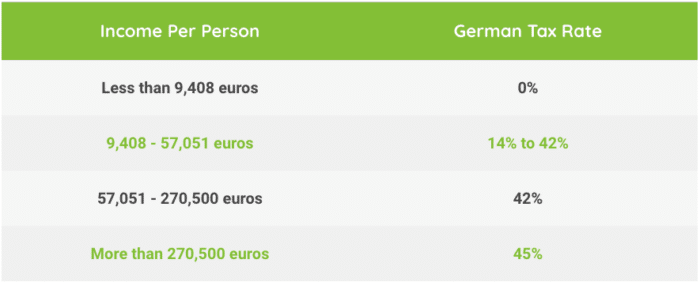Moving to Germany: What you need to know
Willkommen in Deutschland! Thinking about moving to Germany? From Hamburg to Munich, there are so many incredible opportunities in this dynamic country. Home to 83 million people, Germany has the largest economy in the European Union and the fourth-largest GDP in the world.
This nature-loving green country has one-third of its area covered in forests and, indeed it’s true, that there’s no speed limit on the autobahns weaving through the countryside.
Life in Germany can be incredible but there are a few things that you should know before you start packing. Moving internationally is one of the greatest challenges anyone can take on in life and it comes with an endless list of questions.
Wondering what to expect from living in Germany? Let’s break down every single step in your essential moving to Germany guide.
Living / Lifestyle
What Do I Need to Know Before Moving to Germany?
Let’s start with one question that we get asked every day: is moving to Germany a good idea? Moving abroad is a major life decision and it’s important to think about it from a few different perspectives. Beyond just thinking about work, it’s essential to think about everyday living.
Daily Life In Germany
What will it be like on that first fateful day in Germany? A central part of your daily life will be affected by where in Germany you choose to live. The daily routine of a Bavarian villager is markedly different from your average Berliner. So, what kind of German will you be? To put your decision into perspective, the country is about the same size as the US state of Montana or around the same size as the United Kingdom.

Where Is the Best Place to Live in Germany?
Officially known as the Federal Republic of Germany, this country is made up of 16 states. In German, and often in English as well, they are referred to as Bundesländer or sometimes just Länder. Each state has its own unique character and the best one for you depends entirely on your lifestyle.
When you first arrive, especially if you are going to be working in Germany, you’ll likely start out in a city. There are 79 cities that have a population of more than 100,000 people and it can be tough to choose the best for you.
What Is the Best City to Live in Germany?
Düsseldorf was recently ranked the sixth-best city in the world in terms of quality of life and it’s been turning a lot of heads. Meanwhile, Germany’s financial capital, Frankfurt, is famous for its Manhattan-like skyline of skyscrapers and offers great career opportunities.
20,000 ex-pats living in 82 cities across Germany we polled and asked the simple question: What’s the best city in Germany to live in? According to ex-pats in Germany, it’s the city of Aachen!
Spend plenty of time researching different areas to live before you go, especially if you have the option to work in different areas. Finding the right geographic match is going to have a dramatic impact on your quality of life.
Can You Survive in Germany with English?
Germans are famous for their language skills which often leads people to ask if you really need German to live in Germany. The answer is no. And yes.
You can get by in Germany with English. You will find offices that use English as the primary work language and they can be great places to work. You will find English-speaking expat services to help you find a home and do other essentials.
That said, you will never thrive or live a full life without speaking German. You can certainly make friends with people who speak English but you’ll face daily obstacles. You might have a doctor who speaks English, but the receptionist probably won’t. You might find that your co-workers speak English but the people at the grocery store don’t.
Cost of Living
How much do you need to get by in Germany?
How much money do you need to live comfortably in Germany? The best way to get a perspective is to look at the average income in Germany. To give you an idea, the average resident here earns 46,560 euros per year.
The minimum wage in Germany is currently at €9.35 per hour. Of course, in some cities, that can be a fairly comfortable wage for a single person while in others it won’t be enough to get by.
How much does food cost in Germany?
Compared to most countries in western Europe, the price of most food is relatively low. Germany has a sophisticated agricultural industry; this is particularly relevant for staples like bread, cheese, meat and vegetables. Other items locally produced such as wine and beer, are also inexpensive.
Regional products may differ slightly in some regions of Germany, but generally speaking, most items are relatively consistent throughout the country. Buying certain foods “in season” can help to make food even less expensive.
There are also several “Farmers markets” which celebrate locally sourced foods with an emphasis on quality and sustainability, although prices may be slightly higher than supermarkets.

Where should you shop for groceries in Germany?
Local grocery stores are ubiquitous in cities but also in towns and villages throughout the country. These types of stores are sometimes family run and don’t stay open too late (not to be confused with a convenience store), but they are always local and well-stocked, again there can be a focus on local products.
Most towns and particularly cities have most or all of the larger supermarket stores such as Carrefour, Aldi, Netto, and Lidl. Some of these are more competitively priced than others, and Germans certainly like a bargain when they see one.
Public Transport
Perhaps unsurprisingly, the public transport system is very efficient in Germany. There is a network of high-speed trains, buses and even trams linking and servicing many towns and cities. A variety of monthly passes are available.
Bicycles have become increasingly popular with many cities and towns becoming very bicycle-friendly in recent years. Even cities which traditionally have not catered well for cyclists are changing.
How much are Taxis in Germany?
Taxis are very common and reasonably priced, again when compared to other cities in western Europe. It is advisable to avoid unlicensed taxis. Taxis can be found at numerous taxi ranks in most cities and when driving around taxis with the taxi sign illuminated on the roof are available.
Taxi prices are relatively similar from city to city. For a typical 4 km taxi ride costs are as follows.
- Berlin – US$ 12.00
- Bonn – US$ 11.50
- Cologne – US$ 11.00
- Hamburg – US$ 11.70
- Leipzig – US$10.30
- Munich – US$ 11.30

What are approximate prices of products and services in Germany?
- A meal at the standard restaurant is likely to cost roughly €15-20 per person with a local beer priced around €3.80 and soft drinks around €2.20 per can. A reasonable bottle of wine costs approximately €6-8 and a coffee typically sets you back around €3
- At the local supermarkets, a loaf of bread is priced around €1.90, a litre of milk approximately €0.90 and a dozen eggs roughly €2.10
- Public transport is very good with monthly passes at around €80. Taxis start around is €4.00 and then around €2.00 per kilometer thereafter. Petrol is around €1.25 per litre.
- Accommodation is reasonably priced in most cities. A typical 1-2 bedroom apartment in the city would be approximately €950. Outside of the city rent would reduce to around €700.
- Basic utilities for an average two-bedroom apartment will be around €250-280 per month. Prepaid mobile phone charges are approximately €0.20
- per minutes and broadband Internet us roughly €25-30 per month.
To give you a better idea of what to expect in terms of the cost of living in Germany, check out the Numbeo Cost of LIving comparison calculator.
Moving to Germany
What Moving Documents are Needed For Moving to Germany?
Used Household Goods and Personal Effects
- Copy of passport
- Copy of visa
- Bill of lading (BL) / air waybill (AWB)
- Packing list in German or English
- Customs declaration / signed letter by owner of the goods
- Customs registration form 0350
- Letter of employment or botschaftsbescheinigung (returning citizens)
- Anmeldebestaetigung (registration)
- Proof of ownership
- Car documents
- Original bill of lading
- Anmeldebestatigung
- Insurance card from country of origin
- Third-party liability insurance initiated at Customs clearance
- Registration and copy of the title from origin country
- The registration must show a minimum use of the last 6 months prior to shipping / prior to the first registration of the client in Germany
- Vaccination record
- Veterinary health certificate in German or translated by a licensed veterinarian
For more information on restricted and prohibited items and a more in-depth look at documentation please check the International Association of Movers.
Legal / Visas
Finding Work in Germany
If you are looking to work in Germany, you’ll save yourself a lot of stress by finding work before you arrive. The Deutschland website is a great place to get started and they have incredible info that will guide you in the right direction to find work in Germany. Once you start looking at jobs in your field and see their starting salaries, you’ll have a good foundation for creating your budget.
Always rely exclusively on the information directly provided by the Irish government. You will note that all of the websites above have the domain “.gov.ie” and it is essential to always look for this on any site that you visit. While reading info on various blogs is a great starting point, things can change at any time so it’s essential to rely on the official information. Also, be aware that the government does not authorise third-party visa agencies. Sharing your details or getting assistance from anyone other than your employer and the Irish government will only add cost and time.
How Much Does It Cost to Relocate to Germany?
How much money does it cost to move to Germany? Your moving costs will vary significantly, of course, depending on your lifestyle. While a single person might be able to hop on a plane with relatively few costs, a family will need to invest more in the physical moving aspect. Get things moving by requesting 6 moving quotes FREE
When it comes to getting settled into a new home, you can expect to pay about three months of rent as a deposit for a new place (note this will be three months of “cold rent” or Kaltmiete as the Germans call it).

What Are the Visa Requirements to Live in Germany?
Before relocating to Germany, you need to consider the rights that your own citizenship gives you live in Germany. Moving to Germany as an EU citizen is far easier than moving to Germany from the UK or the USA, for example.
EU Citizen Benefits in Germany
If you have EU citizenship, the process of moving to Germany is comparatively simple. For anyone from one of the 27 countries of the European Union, all you actually need is a valid passport or official ID. On top of rights for European Union citizens, these benefits are also extended to citizens of Iceland, Liechtenstein, Switzerland, and Norway. If you are an EU, EEA, or Swiss citizen, all you need to do is register on arrival and you have the right to stay for an unlimited period of time.
Registering in Germany as an EU Citizen
On arrival, you must register at your local Bürgeramt or Einwohnermeldeamt. Legally, this must be done within one to two weeks of finding a permanent home (the exact requirement depend on your town). Once you go to the registration office, you will receive a certificate of registration, called a Meldebestätigung.
Be aware that they do not speak English in these offices so come prepared or bring a friend. Generally speaking, you just need an A2 language level and the ability to give your basic information.
In order to do your registration, you will need to have your valid EU national identity card or passport. Before you go, complete an Anmeldeformular form, which you can find online for free on the official site. Along with this, bring a lease or other proof of accommodation signed by your landlord.
When you move addresses, it is also mandatory to de-register. This is an important step and legally required (even if you are moving to leave Germany) so keep it in mind as you settle into the country
EU Family Member Residence Card in Germany
If you are a non-EU citizen who has an EU family member, you may already have the right to live in Germany. If your spouse or registered civil partner has EU citizenship, you share their rights. This applies as well if your parents or grandparents are EU citizens. With these family ties, you can get an EU family member residence card in Germany that is valid for five years. You can read all of the details on the European Union website.

Moving to Germany As a Non-EU Citizen
If you do not have EU residency rights you will need to get a certificate of residence in Germany, called a Freizügigkeitsbescheinigung.
Without German citizenship or EU residency rights, the most common way to get a visa is to find a job. If you have skills that are in-demand, your workplace can organise a visa for you.
Moving to Germany from the UK without a job or visa in place used to be possible, it’s important to be prepared before you arrive. For non-EU citizens, there are a few options to live legally in Germany.
Getting an EU Blue Card
If you are a high skilled worker who has achieved a higher education degree, especially within the STEM (Science, Technology, Engineering, Mathematics) sector, you may be able to get an EU blue card.
When you are able to find a job that pays at least €50,800 per year and prove that you can speak a high level of German, you are eligible. The EU Blue Card is valid for four years. If you maintain your job for these four years, you will be able to apply for permanent residency in Germany.
Requirements for Residency in Germany
In order to get a residency visa in Germany, you must show that you don’t have a criminal record and speak at least a B1 level of Germany. If you have a family member with EU residency, however, these requirements don’t apply.
Money & Taxes
Banking & Taxes in Germany
When you are relocating to Germany, figuring out banking and taxes will be at the top of your moving checklist.

H3 How to Open a Bank Account in Germany
When you are looking to open a bank account in Germany, you will have a few different options. First of all, you can go for a bank account for non-residents of Germany. This could be a good option to get organised before you moved. If you live within the European Union, it will be fairly straightforward to continue using your account indefinitely after arrival.
Did you know that with the single euro payments area (SEPA), as soon as you have one eurozone bank account, you don’t need to open another? Opening an account in your home country can make life easier and have you ready to hit the ground running. Do note, however, that while this is the law, it’s loosely enforced across Europe. You may find that it’s a hassle to not have an IBAN (account ID number) that relates to your country. For this reason, you might consider a Germany-based online bank like N26 which issues Germany IBAN for the residents of many European countries.
How Do Taxes Work in Germany
Taxes range from 14 per cent to 42 per cent in Germany. If you are single, the starting tax allowance is for €9,408 in income. If you are married or in a civil partnership, your initial allowance is for €18,816. Once you hit an income of €250,731 for single people or €501,462 for couples, you will reach the 42 per cent taxation rate.
Here’s an idea of what to expect in terms of German taxes. Do note, of course, that these change every tax year so research again before you move.

Climate & Weather
What’s the Weather like In Germany?
Germany has a moderate climate and does not generally have sustained periods of hot or cold weather.
The coastal area to the north-west of the country has a maritime climate with mild, wet winters and warm summers. The temperature variations between seasons are not too extreme.
As you move further inland, the climate becomes more continental, with seasonal temperature differences become much greater. The winters are colder and the summers a little warmer. In southern parts of Germany the summers can get extremely hot.
In the extreme south of the country in the mountainous Alpine region the mountain climate brings lower temperatures overall and can suffer extremely cold winters with occasional gale force winds in late Autumn.

Buying & Renting a Home
The current housing situation in Germany
It’s the best time for years to buy a property, be it a house or an apartment in Germany. Interest rates are at the lowest levels for many years and prices especially in rural areas and smaller towns and suburbs are at reasonable levels.
It is true that property prices in the major cities have increased in recent years, particularly in places like Berlin, Dusseldorf, Frankfurt and Munich, but even then prices remain moderate compared to many other European cities.
It is still a common trend for Germans to buy homes for the long-term rather than flipping property or continually upgrading, which tends to lead to less of a price fluctuation in the market.
Location, school districts, transportation links and other infrastructure concerns are all major factors which should be considered and which are highly valued in Germany.

How to find a home in Germany
You are unlikely to see many “For Sale” signs in windows or positioned in a front garden. Many properties in Germany are listed online or in newspapers and you will often see mention of von privat which essentially means there is no real estate agency involved. Some adverts will include maps and the direct contact details of the owner, so this is a good place to start, although this method can be a little time-consuming.
On average, Germans spend 34% of their income on their total living expenses. Keep this percentage in mind as you start planning. Before you are ready to move, look at apartments to get an idea of what to expect and how to budget. The most common places to search for apartments and houses are on Immobilienscout24 and Immowelt. These are prime places to start your search for an apartment. While using agency might seem tempting, it is very costly in Germany. If you even have basic German, it’s worth starting the search online.
Are their fees associated with buying a home?
Finding your property through an agent or an Immobilienmakler can expedite the process and make life easier, however, there are commission charges which then apply, this can range between 3-6% of the purchase price, but sometimes can be split between the buyer and the seller.
In addition, there are closing costs which, depending on locations, can range between 5-15% of the sale price, so this can be considerable. Once the property price has been agreed upon both buyer and seller sign the contract, which is in German and so it pays to have a translator on hand. The signing should take place in front of a notary who will charge around 2% but this will include preparation of the contract and land registry formalities.
Healthcare
Does Germany provide free public healthcare?
Yes, (and no), all nationals and legal residents of Germany are entitled to free public healthcare paid for from social security. The more you earn, the more you pay. However, this does not cover things like hospital stays, outpatient treatment and any pregnancy fees.
What does the public healthcare cover?
It covers most of the general medical requirements, such as doctors visits, prescriptions, inoculations, dental checks etc.
Workers in Germany, earning a gross salary of less than EUR 5,200 (USD 6,100) are encouraged to set up health insurance, known locally as gesetzliche krankenversicherung (or GKV). It is possible to continue using the public health system, but you would now have to pay, and the maximum premiums would apply which equates to roughly 15% of your monthly pay and is deducted from your salary. However, in most cases your employer will shoulder half of this expense.

Education
How Does Education Work in Germany?
Germany has some of the best schools in the world. Education is free to all kids between the ages of six to 18 years old. For residents of any nationality, there are free university options as well. From age six to 11, kids attend a primary school called a Grundschule.
While school is only mandatory starting from age six, it’s common to attend school much earlier. There are privately-managed nursery schools called Kinderkrippe that you can pay to send kids under the age of three. From three to six years old, Kindergartens work on a sliding scale depending on your salary. Daycare centres called Kitas are available before and after school for kids ranging from age 3 to 12.
After age 12, your family has a few different options. For those planning to attend university, Gymnasium is the standard option. For kids looking to prepare for a vocation, there are Realschule or you can opt for a Hauptschule, which is focused on practical work skills. Meanwhile, there are also Gesamtschule, which combine the elements of a Realschule and Hauptschule.
Education in Germany is regulated by each individual federal state, however, the general standard is very good. One benefit is that German class sizes are relatively small. Children normally start education at the age of six and attendance is compulsory. It is also required that pupils remain in education until the age of at least 15, although it is very common for students to continue with further education until 17, 18, or beyond.
For full details, you can get more info from the Association of German International Schools.
How about International schools in Germany?
There are many international schools throughout Germany and their costs range anywhere from €12,000 to €21,000 per year. These schools tend to have a very high standard of education, with excellent facilities, small class sizes and may include a more diverse mix of multicultural pupils than state-run schools.
It is common for English to be the main language used for the purposes of tuition, although there are French, German and Italian schools (among others), which are multilingual.
Boarding schools and with the exception of some religious schools, all-girls/all-boys schools are rare.

Homeschooling and special needs schools in Germany?
Homeschooling in Germany is uncommon and not encouraged by the authorities, although special arrangements can be made. Since the COVID-19 pandemic, rules and regulations in this area have begun to relax and it remains to be seen if these changes will remain in place permanently.
Special-needs schools are plentiful for children with learning/physical disabilities.
Higher learning in Germany
If you are studying an undergraduate, graduate, or vocational degree anywhere within Germany, you can get a temporary student visa. This will allow you to attend your school and work full-time for 120 days per year or get a part-time job that lasts for 240 days. Once you have your degree, you can extend your visa by 18 months in order to find a job in the country. After you have a job, you can apply for an Employment Residence Permit.
Final Thoughts
Moving to a new country can be a little disconcerting, and left unchecked these feelings can develop into anxiety and stress. Moving to Germany, as we have seen, brings with it both exciting opportunities with some potential challenges. However, embracing the changes and adopting a proactive approach through the advice, tips and links we have provided sets you firmly on course to a successful relocation to Germany.
Why not get things moving by completing our simple form, enabling international movers to start work on your moving quotation, today!








